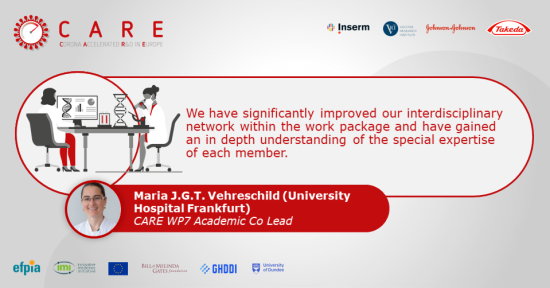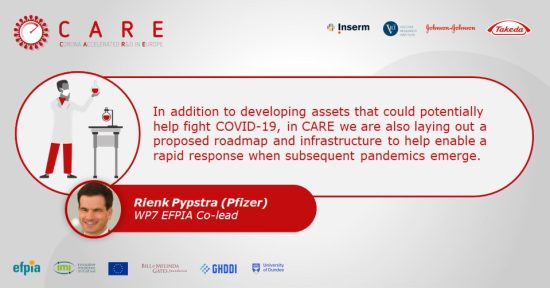February 23rd 2023
The faces behind the CARE work-packages – WP7
The faces behind the CARE work-packages – WP7
CARE (Corona Accelerated R&D in Europe) is the largest European research initiative addressing the challenges of COVID-19. It is no surprise that it is designed in a comprehensive, yet agile, structure to fulfill the 37 partners’ shared key goals: (1) to identify therapeutics for the current pandemic, (2) to identify antiviral therapies for future outbreaks and (3) to increase the understanding of the pathophysiology of COVID-19. In a set-up of eight work-packages (WPs), the scientists and management at CARE carry out the project activities that have so far resulted in valuable learnings about COVID-19 and how it might be defeated.
In this series, we go behind the scenes through brief interviews with the leadership of each of the eight CARE work-packages to hear insights on what makes their work so special, as well as their challenges and hopes.


WP7 – Clinical Evaluation of repurposed or novel SARS-CoV-2 antivirals or antibodies
The CARE work-package 7 (WP7) aims to clinically evaluate repurposed or novel SARS-CoV-2 antivirals or antibodies through two phase 1 and one phase 2 clinical trials. Maria Vehreschild (Goethe University Frankfurt) and Rienk Pypstra (Pfizer) provided us a short interview with insights into the activities of this work package, its highlights and the challenges that they had to overcome.
How has the collaboration within your WP team developed over the past two years?
Maria: We have significantly improved our interdisciplinary network within the work package and have gained an in depth understanding of the special expertise of each member.
Rienk: We came to the CARE project with shared goals, but to be most effective in meeting them, we had to get to know each other and the strengths we could all contribute. Over the last two years, we’ve learned many ways in which our diverse technical expertise and experiences are quite complementary.
What has surprised you about working on the CARE project?
Maria: Even though we were not able to meet in person over a long period of time, it is impressive how so many experts in their specific fields have still been able to connect and contribute to the entire consortium in a meaningful way.
Rienk: Particularly given how rapidly this public health situation was evolving around the globe, I was impressed with the progress the entire CARE team made to advance activities across workstreams and evaluate assets that could potentially progress into clinical trials.
What makes the work for CARE special for you and your WP team?
Maria: We enjoy working with our international partners and exchanging ideas with them on the challenges that are inherent to the design and conduct of clinical trials.
Rienk: In addition to developing assets that could potentially help fight COVID-19, in CARE we are also laying out a proposed roadmap and infrastructure to help enable a rapid response when subsequent pandemics emerge.
What highlights can you share from two years with your WP team so far?
Maria: I truly appreciate the open-minded attitude and communication among the members of our work package.
Rienk: Because our work package focuses on clinical evaluation, our team had to exercise patience while candidates were identified to progress into Phase 1 and Phase 2 clinical trials. But, in the process, we have developed a strong collaborative framework that we believe will further enhance understanding of this disease and approaches to help combat it.
What are or were the biggest challenges within WP7? (and how did you overcome them?)
Maria: We are still looking forward to the identification of a drug to be assessed in a clinical trial.
Rienk: One of the biggest challenges for me was balancing the forward-looking preparation required to take assets into clinical development with the uncertainty of not knowing which might be promising enough to advance. We continue to refine this balance every day, as it is the nature of our work.
